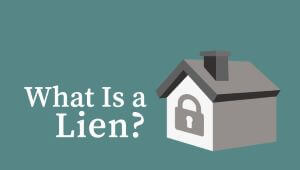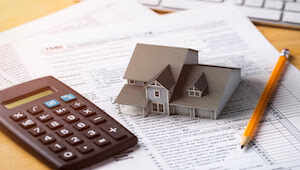
What’s a Lien?
A lien is a legal claim or a form of security against assets and is used to make good on debts or other financial obligations you may have. For example, if you’ve financed a home through your bank and you start missing mortgage payments, the bank can take out a lien against your home, take possession, and then sell it to get their rightful money owed.
Who Can Establish a Lien?
A lien against your property can be established by a tax authority like the IRS, through a creditor, or by legal judgment in a county, federal, local, or state court system. If you don’t complete your end of the financial bargain, creditors have the legal right to seize and sell your assets to recoup their money. Some liens are publicly filed so that potential buyers of your assets will be aware of any liens that must be satisfied before a sale can be completed so you won’t be able to sell your house until the lien is paid.
Can You Have Unknown Liens on Your Property?
Yes, it’s also possible you could have a lien placed on your property without even knowing it initially so any warning signs of non-payment notices should never be ignored. DomiDocs HomeLock™ proactively protects your property from any liens publicly filed against you by actively monitoring and scanning 200+ data points daily.
How Can I Remove a Lien?
As a general rule of thumb, a lien will remain in place until the creditor has been repaid in full. For a property lien, it’s important to note that the lien is tied into the property and not the owner of the property. You may need to legally file a Release of Lien form which serves as proof that the debt has been paid off. Other ways of removing a lien from a property include negotiating with creditors to settle your debt, providing proof that a debt has been settled for the lien to be removed, and/or by taking legal action through the courts with the lien holder to enforce removal. Discharging a lien may also vary by county and/or state.
Types of Liens
When it comes to liens on properties, there’s no shortage of types. Here are some of the most common liens that can apply to homeownership:
- Child support lien: if you don’t pay the child support or alimony you owe, a child support lien can be involuntarily placed on your property forcing you to sell to pay off the debt.
- Contractual lien: a contractual lien is a legal claim against a property that was voluntarily provided as with a mortgage; if you don’t pay, the bank has the right to take your home and recoup its money.
- First lien: if a borrower defaults and property was used as collateral for that debt, a first lien is paid back before any other liens, such as with a federal tax lien; a first lien takes priority over all other liens.
- HOA or COA lien: homeowner associations (HOA) and condominium owner’s associations (COA) have the power to obtain a lien on your property if you neglect to pay the monthly HOA fees or don’t comply with their requirements; this also applies to a property owner’s association or POA.
- Judgment lien: if a homeowner faces a scenario where they’ve been sued, loses, and can’t pay the settlement, a judge will order a lien against their property; likely scenarios here include lawsuits from vehicle accidents and/or small claims court rulings.
- Mechanics lien: if there are contractors or real estate developers who haven’t been paid for their time or materials, a mechanics lien can be placed on your home.
- Mortgage lien: as your mortgage lender has a stake in your home, if you don’t keep up with the payments, a mortgage lien can be placed forcing you to pay up or risk losing your property through foreclosure. A first mortgage is also considered to be a primary lien.
- Municipal lien: this type of lien could be placed on your property in regards to unpaid utility bills, code violations, expired permits, and/or other municipal debts/regulations not satisfied.
- Property Tax lien: is a legal claim filed against a property resulting from unpaid property taxes; this prohibits a property from being refinanced or sold until the lien is settled.
- Super lien: while they vary from state to state, a super lien generally includes the spectrum of property tax liens, mechanics liens, and/or any claims filed against a homeowner by an environmental protection agency such as in Connecticut or Massachusetts.
- Tax lien: is a legal claim filed by the government against your property and assets when you don’t pay your taxes as required; this could occur on a federal, local, or state level, with federal taking priority over all other possible liens.
- Voluntary lien: is a lien where the property owner voluntarily grants a legal claim to the property to another party as a guarantee for debt repayment.
Don’t become a victim of an unknown lien! Stay ahead of the curve with DomiDocs HomeLock™, the only proactive digital property monitoring service that continually scours third-party listing sites and official government records to alert you before any damage is done. HomeLock™ offers everything you need to protect your home from unknown liens and fraud, along with alerting you to any missed payments or unpaid bills. Be sure to sign up for HomeLock™ today!
For more information about the prevalence of property fraud and cybercrime, view our Property Fraud News and Videos.
Author – Connie Motz


